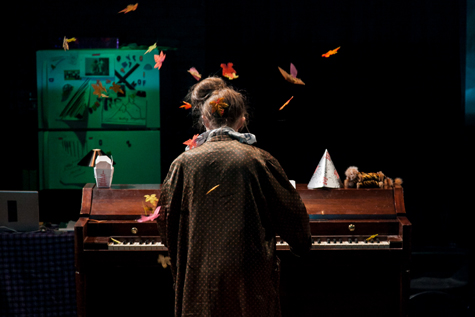
Here are a few things about
Gertrude Stein. These are things I like, things that excite my lively interest, things that have motivated me in working on Reread Another. One is this: where does it begin? It seems to begin again and again, and there is always a way in which it seems to have already begun. This muddle of the beginning has fascinated me for a long time. There is the text of the play and there is a curtain speech or an announcement, and there is action and the physical presence of people, and there is walking through the door; there is the lights changing or not changing, and there is if you are very lucky and I say that because I do love such things and I do feel myself to be quite traditional, there is a curtain. It is all happening. How wonderful to walk into a theater where things are just happening. Time hangs. We are all just here now, all the time. That is one goal: to always be in the total present. Now. Now. Virginia Woolf wrote to Leonard: “stay this moment.” She was remembering Goethe’s Faust, because that is what he wanted too: to say to the moment “stay! You are so beautiful.”
Stein says somewhere that she wants to deliver the story without telling the story. The story is also just there, simply present without a progression through time. So it all comes upon the heart and the mind at once and from every direction. I think there are many stories in Reread Another. Some of them I recognize, some of them I remember, many of them I do not know. They are in other people, people who are in the play and people who are outside the play. For me, having many systems that overlap and may or may not line up is a part of what any good play does. I can grasp it in many ways at different times, but there are always parts of it I cannot grasp. But I can touch them.
And they can touch me. I find Reread Another desperately poignant. I hope it will be for audiences too. I find this in the text. It is about love and loss and remembering things we have had. That also connects to the history of Stein in the play, the war and being in France and being American. So it is, in a way, nostalgic for a past I never had. This of course also connects to having no beginning and to being always present. A play is always present, but a play is also the enactment of remembered language and action. So is it present or is it past? And if I remember something, am I not living that memory in the present? But it is never present. That is impossible. So I have it and I do not have it. Like my life. Now. Now.
David Herskovits
Artistic Director